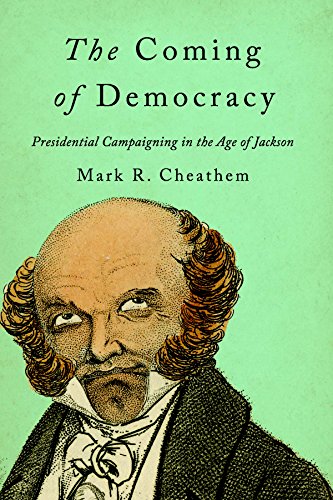Cumberland University professor Dr. Mark Cheathem was awarded the 2019 Phi Alpha Theta History Honors Society Best Subsequent Book Award for his 2018 publication, The Coming of Democracy: Presidential Campaigning in the Age of Jackson.
The Coming of Democracy is the first book-length treatment to reveal how presidents and presidential candidates used both old and new forms of cultural politics to woo voters and win elections in the Jacksonian era. The book covers an exploration of political campaigns from 1824 to 1840, focusing on the elections of Presidents John Quincy Adams, Andrew Jackson, Martin Van Buren and William Henry Harrison.
“I’m honored to have received this award from Phi Alpha Theta’s national office,” said Dr. Cheathem. “The Coming of Democracy addresses presidential campaigning techniques from nearly 200 years ago that is still relevant today.”
Dr. Cheathem’s main areas of expertise and interest focus on Presidents Andrew Jackson and Martin Van Buren, nineteenth-century politics, southern history and documentary editing. He is currently the project director and main editor of CU’s Papers of Martin Van Buren project, which has been producing digital and print editions of the eighth president’s papers since 2015.
“We are very lucky to have Dr. Cheathem among our faculty here at CU,” said Dr. Eric Cummings, dean of the School of Humanities, Education, and the Arts. “His expertise in the early American republic is wide and impressive, and his dedication to the Papers of Martin Van Buren has been crucial to its success.”
The Coming of Democracy is also a finalist for the Sally and Morris Lasky Prize, which the Lebanon Valley College’s Center for Political History awards annually to the best book on American political history.
Dr. Cheathem’s book can be found online in print and audio format.

For more information on The Coming of Democracy: Presidential Campaigning in the Age of Jackson, visit https://www.press.jhu.edu/news/blog/coming-democracy-presidential-campaigning-age-jackson.
For more information on the Papers of Martin Van Buren, visit http://vanburenpapers.org.


